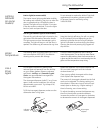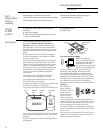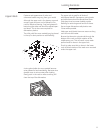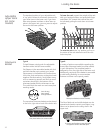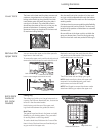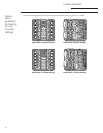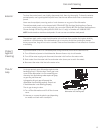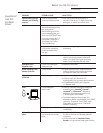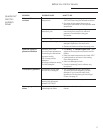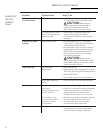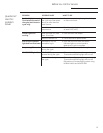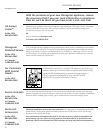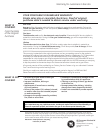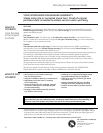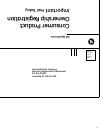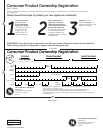
17
Questions?
Use this
problem
solver
PROBLEM POSSIBLE CAUSE WHAT TO DO
Dishes and flatware Low inlet water • Make sure inlet water temperature is at least
not clean temperature 120°F (49°C) (see Using the Dishwasher section).
• Run water at the nearest faucet prior to
starting the dishwasher to insure optimal water
temperature.
Water pressure is • Turn on a faucet. Is water coming out
temporarily low more slowly than usual? If so, wait until
pressure is normal before using your
dishwasher.
Air gap is clogged • Clean air gap.
Improper rack loading • Make sure large dishware does not block the
detergent dispenser or the wash arms.
• Glasses and dishes must face the spray arms.
Spots and filming on • Use Jet Dry
®
or Cascade Crystal Clear
®
rinse
glasses and flatware agents to remove spots and prevent new film
buildup.
• Make sure water temperature is at least 120°F.
• Load dishwasher as shown in the Loading
Place Settings section.
• Make sure detergent is fresh.
• If water is extremely hard, a softener may
be required.
Cloudiness on glassware Combination of soft water • This is called etching and is permanent.
and too much detergent To prevent this from happening, use less
detergent if you have soft water. Wash
glassware in the shortest cycle that will get
it clean. See page 10.
Water temperature • Lower the water heater temperature.
entering the dishwasher
exceeds 150°F (66°C)
Black or gray marks on Aluminum utensils have • Remove marks with a mild, abrasive
dishes rubbed against dishes cleaner.
Extremely hard water
Low inlet water temperature
Overloading the dishwasher
Improper loading
Old or damp powder
detergent
Rinse agent dispenser empty
Too little detergent
Before You Call For Service
Dishwasher



